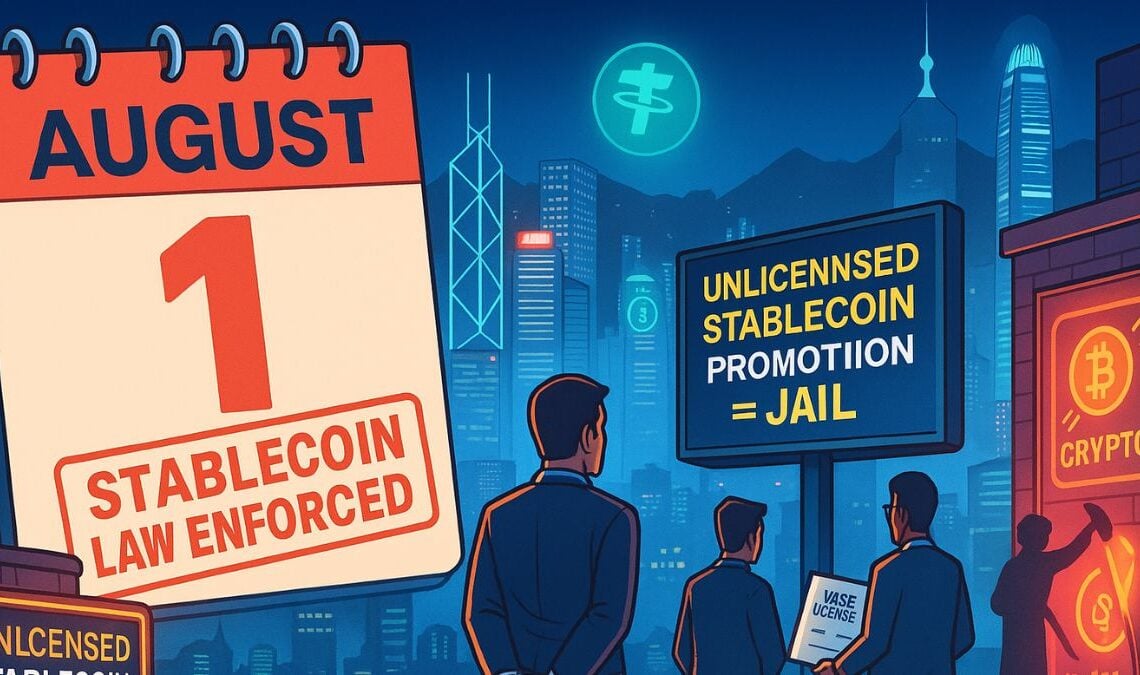Hong Kong is stepping up its regulatory game. Starting August 1, any unlicensed stablecoin promotion will be considered a criminal offense, according to the latest ordinance published in the official government gazette. This move sends a strong signal to both local and international crypto players: compliance is no longer optional.
The new legislation specifically targets marketing, advertising, and public promotion of stablecoins by unregistered entities. Violators could face substantial fines or even imprisonment, placing Hong Kong among the strictest jurisdictions globally when it comes to stablecoin oversight.
What the Law Covers — And Who It Affects
Under the new framework, only companies with a valid VASP (Virtual Asset Service Provider) license issued by the Hong Kong Monetary Authority (HKMA) will be allowed to promote or distribute stablecoins to the public. As detailed in the HKMA’s July insight, the regulation was designed to “enhance investor protection and uphold financial stability.”
The law defines stablecoin promotions broadly, including digital campaigns, influencer endorsements, online banners, social media posts, and even in-person seminars. This wide scope means even offshore firms could fall under scrutiny if they target Hong Kong residents.
According to Bloomberg, the legislation is part of a broader push by Hong Kong to assert itself as a global crypto hub—while keeping control over the rapid growth of stablecoin activity.
Why the Sudden Push?
The HKMA has expressed growing concern over the “unregulated circulation and marketing” of stablecoins such as USDT and USDC, which often bypass formal banking channels and risk undermining monetary policy. The emergence of new algorithmic and yuan-backed stablecoins has only accelerated the urgency.
Excerpt from Hong Kong’s upcoming Stablecoin Ordinance. Source: Hong Kong government
The authority also noted that some bad actors have been exploiting the lack of clear marketing boundaries to mislead retail investors, especially through social media influencers and affiliate schemes. The new rules aim to plug those gaps.
As per the HKMA statement, these efforts are aligned with the global standards proposed by the Financial Stability Board (FSB) and IMF, both of which have encouraged jurisdictions to impose marketing restrictions on unregulated stablecoin issuers.
Industry Reaction: “A Wake-Up Call”
For crypto companies, this is more than just a compliance headache. According to fintech observers, the law may force major stablecoin issuers to re-evaluate their Hong Kong presence or risk being blacklisted. “It’s a wake-up call,” said one analyst quoted in Bloomberg. “Hong Kong is saying loud and clear: get licensed or get out.”
However, some also see opportunity. Projects that gain early approval under HKMA’s VASP regime could enjoy a first-mover advantage, as others scramble to adjust. The regulatory clarity may attract institutional players seeking a compliant route to stablecoin deployment.
What’s Next for Crypto Marketing in Hong Kong?
From August 1 onward, platforms and creators promoting unlicensed stablecoin products will need to tread carefully. Penalties could include fines up to HK$5 million (approximately $640,000 USD) and imprisonment of up to 7 years, depending on the severity of the violation.
Importantly, the HKMA is expected to launch a public database of licensed issuers, allowing users to verify whether a given stablecoin promotion is legally authorized. Until then, investors are urged to exercise extreme caution and avoid engaging with unknown promoters.
Meanwhile, several major exchanges and stablecoin providers have reportedly begun revising their Hong Kong marketing strategies to comply with the new law.
Final Thoughts: Unlicensed Stablecoin Promotions Face Their Deadline
The criminalization of unlicensed stablecoin promotions in Hong Kong marks a turning point in crypto regulation—not just for the region but for the global industry. As regulators worldwide look for templates to control digital asset marketing, Hong Kong is offering one of the clearest and strictest models yet.For crypto firms, the message is simple: regulatory alignment isn’t optional anymore—it’s survival. For investors, it’s a signal to stay vigilant and verify before engaging. The countdown to August 1 has begun, and what happens in Hong Kong could ripple across crypto markets worldwide.










